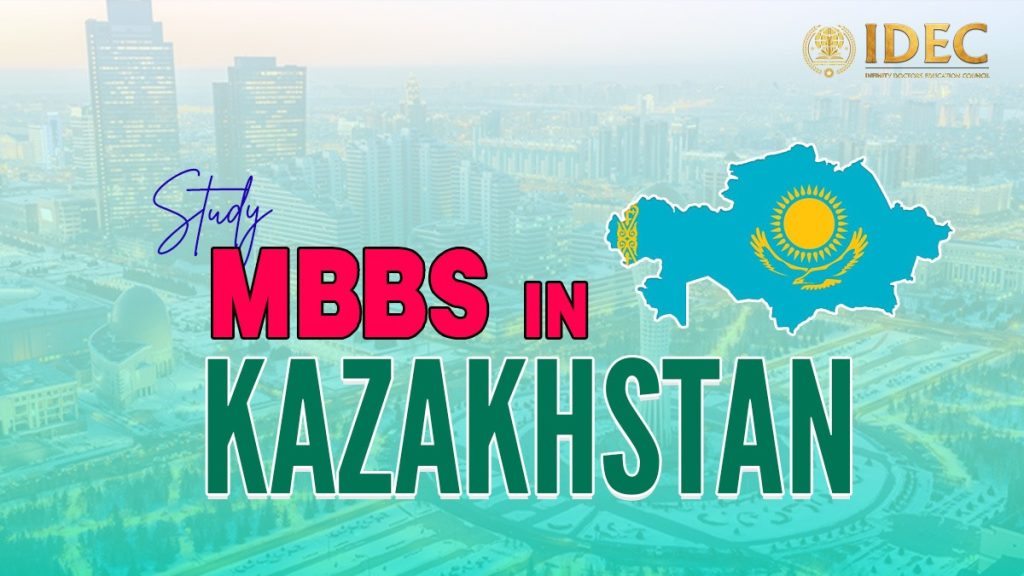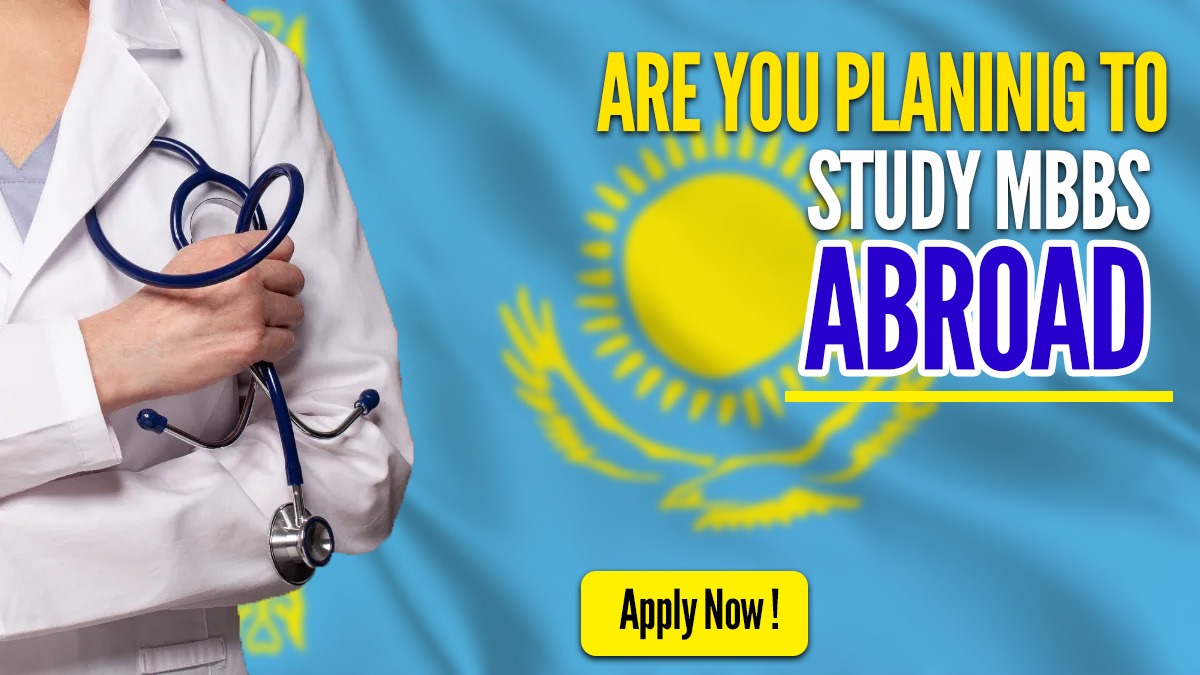Study MBBS in Kazakhstan
Kazakhstanis a popular choice for MBBS studies due to its affordability, globally recognized degrees, and English-medium instruction. Many medical universities in Kazakhstan are recognized by the World Health Organization (WHO) and the National Medical Commission (NMC).
About Kazakhstan
The world’s biggest landlocked nation, Kazakhstan, is home to magnificent mountains, enormous steppes, and a rich cultural legacy. It is bordered by the Caspian Sea, Turkmenistan, Kyrgyzstan, Uzbekistan, China, and Russia. It is located in Central Asia and partially in Eastern Europe. Almaty continues to be the center of culture and commerce, while Astana, the capital, combines traditional Kazakh elements with contemporary architecture. Kazakhstan, which is well-known for its wealth of natural resources, has a rapidly expanding economy and a friendly atmosphere for tourists from across the world. Offering friendly hospitality, distinctive food, and exciting festivals, the nation’s culture is a dynamic blend of contemporary lives and nomadic customs. Kazakhstan is becoming a popular destination for international students, particularly those seeking MBBS, thanks to its reasonably priced educational system, internationally renowned universities, and safe, student-friendly atmosphere.
Why Choose to Study MBBS in Kazakhstan?
Due to its mix of reasonably priced education, excellent training, and internationally recognized degrees, Kazakhstan has rapidly become more and more popular among international medical students, particularly those from India. The following are the main factors that make MBBS in Kazakhstan a great option:
- Medical education in Kazakhstan costs significantly less compared to countries like the USA, UK, or Australia, making it accessible for students from middle-income families.
- Most medical universities are approved by WHO, NMC (India), ECFMG (USA) and other major medical bodies, ensuring graduates can practice worldwide.
- Many universities offer MBBS courses in English, removing the language barrier for foreign students.
- The medical curriculum is designed in line with international guidelines, with a strong emphasis on practical training in modern hospitals.
- Kazakhstan is known for its hospitality, cultural diversity, and low crime rate, making it a safe destination for international students.
- Indian food availability, familiar festivals, and a large community of Indian students help create a homely atmosphere.
- Admission is based on NEET qualification without the need for heavy donations.
- Medical universities are equipped with advanced laboratories, simulation centers, and well-maintained hostels.
Studying MBBS in Kazakhstan offers an ideal balance of quality education, affordability, and career opportunities, making it one of the most sought-after destinations for aspiring doctors
Eligibility Criteria for MBBS Admission in Kazakhstan
Kazakhstan offers a simple and transparent admission process for international students. To secure a seat in an MBBS program, you generally need to meet the following requirements:

Educational Qualification
- Must have completed 10+2 or equivalent from a recognized board.
- Subjects in Class 12: Physics, Chemistry, and Biology (PCB) as core subjects.
- Minimum aggregate: 50% marks in PCB.
NEET Qualification (For Indian Students)
- As per NMC (National Medical Commission) guidelines, Indian students must qualify NEET in the admission year to be eligible for practicing medicine in India after graduation.
Age Requirement
- Minimum age: 17 years as of 31st December of the admission year.
- No upper age limit as per Kazakhstan universities, but NMC eligibility rules may apply.
Language Requirement
- Most universities offer English-medium MBBS programs, so no IELTS/TOEFL is required.
- Students may need to learn basic Russian/Kazakh during the course for clinical practice
Advantages of Studying MBBS in Kazakhstan for Indian Students
Here are the key advantages of pursuing an MBBS program from Kazakhstan:
- In Kazakhstan, the admissions procedure is straightforward.
- Donations to Kazakhstani universities are not required.
- WHO, NMC, IMED, and USMLE all recognize medical universities.
- Kazakhstan’s medical colleges continue to provide top-notch instruction.
- In Kazakhstan, medical candidates who wish to apply for admission to the MBBS program are exempt from taking any entrance exams.
- Students can often qualify for international contests because of the high caliber of medical education.
- The MBBS program in Kazakhstan gives students the chance to experience life abroad.
- In addition to being reasonably priced, MBBS programs in Kazakhstan give students access to top-notch instruction.
- The cost of life is relatively low, and lodging is very reasonably priced.
- Kazakhstani medical universities have a flexible credit-hour structure that is advantageous to students.

Career Opportunities After Completing an MBBS Degree from Kazakhstan
Kazakhstani graduates with an MBBS have several options for employment both domestically (for instance, in India) and abroad. The World Health Organization (WHO), the National Medical Commission (NMC, previously MCI) in India, and other international medical organizations accept the degree, opening possibilities for additional study, research, and practice across the world. Here is a thorough rundown of potential job paths:

Clinical Practice
- In India: Graduates must pass the Foreign Medical Graduates Examination (FMGE), which will shortly be replaced by the National Exit Test (NExT), in order to practice medicine in India. Success enables them to pursue postgraduate courses in India, work in government or private hospitals, or start their own private practice.
- Graduates can get a license to practice in Kazakhstan and its neighboring countries. Public health agencies, clinics, and hospitals, both private and public, provide opportunities. Kazakh speakers may also find employment in nearby nations such as Kyrgyzstan, Uzbekistan, or Russia.
- Internationally: The United Arab Emirates, Saudi Arabia, Qatar, the United States, the United Kingdom, Germany, Australia, and New Zealand are among the many nations that accept the MBBS degree. Graduates must pass the appropriate licensure tests (such as the USMLE for the US, PLAB/UKMLA for the UK, and AMC for Australia) in order to practice.
- Additional Clinical Roles: Graduates can pursue careers in pathology, anesthesia, emergency medicine, geriatrics, and other hospital-based specialties.
Postgraduate Study and Specialization
- India: After passing the necessary admission examinations, graduates can pursue MD, MS.
- Internationally: If the required entry tests are passed, options include postgraduate programs (MD, MS, or equivalent) in the US, UK, Germany, Canada, and Australia.
- Kazakhstan: Postgraduate specializations in Kazakhstan are also open to Indian graduates who speak Russian or Kazakh well.
Research and Academia
- Medical Research: Graduates can find employment in drug discovery, clinical trials, biotech firms, epidemiology, and research organizations.
- Teaching: A large number of physicians, both in India and beyond, go on to teach in medical schools and universities.
Healthcare Administration and Non-Clinical Careers
- Hospital and Healthcare Management: MBBS graduates can enter healthcare administration, policy, hospital management, or consultancy, often after pursuing an MBA in Healthcare or Hospital Management.
- Pharmaceutical and Med-Tech Industries: Roles are available in regulatory affairs, clinical research management, medical sales, product development, and med-tech innovation.
- Medical Writing and Content Creation: There is demand for medical graduates in writing for journals, digital platforms, patient education, regulatory documentation, and healthcare marketing.
Public Health and Global Health: Opportunities exist with government agencies, NGOs, and international organizations focused on healthcare delivery, health policy, and global health initiatives.
Kazakhstan – Is it Safe for Indian Students?
Yes, Kazakhstan is considered a safe and welcoming destination for Indian students pursuing MBBS. The country has a low crime rate compared to many other international study destinations, and the people are known for their hospitality and respect towards foreigners.

Why Kazakhstan is Safe for Indian Students
- Kazakh people are warm and respectful towards international students, especially from India, due to growing cultural and educational ties.
- Violent crime is rare, especially in student-populated areas. Most universities have their own campus security systems.
- Most medical universities provide secure on-campus hostels with CCTV surveillance, wardens, and 24/7 security guards.
- Indian students find it easier to adapt due to shared values like respect for elders, hospitality, and community living.
- Thousands of Indian students already study in Kazakhstan, creating a strong support network for newcomers.
- Kazakhstan enjoys relative political stability and is considered one of the safest countries in Central Asia for foreign education.
- Accessible and affordable healthcare facilities are available, and most universities have tie-ups with local hospitals.
Hostel and Accommodation Facilities in Kazakhstan
Kazakhstan’s medical universities offer safe, affordable, and comfortable accommodation options for international students, including those from India. Students can choose between university hostels and private rentals based on their budget and preferences.

Features:
- Fully furnished rooms (2–4 students per room)
- Study tables, beds, wardrobes, and heating facilities
- 24/7 security with CCTV surveillance
- Common kitchens for self-cooking
- Indian mess facilities in many universities
- Laundry and Wi-Fi services
- Separate hostels for male and female students
- Many hostels offer Indian canteens with vegetarian and non-vegetarian options.
- Students can also cook in shared kitchens.
- Indian grocery stores are available in cities like Almaty, Astana, and Karaganda.






